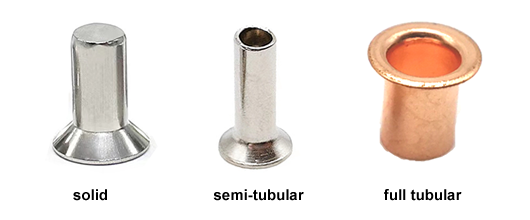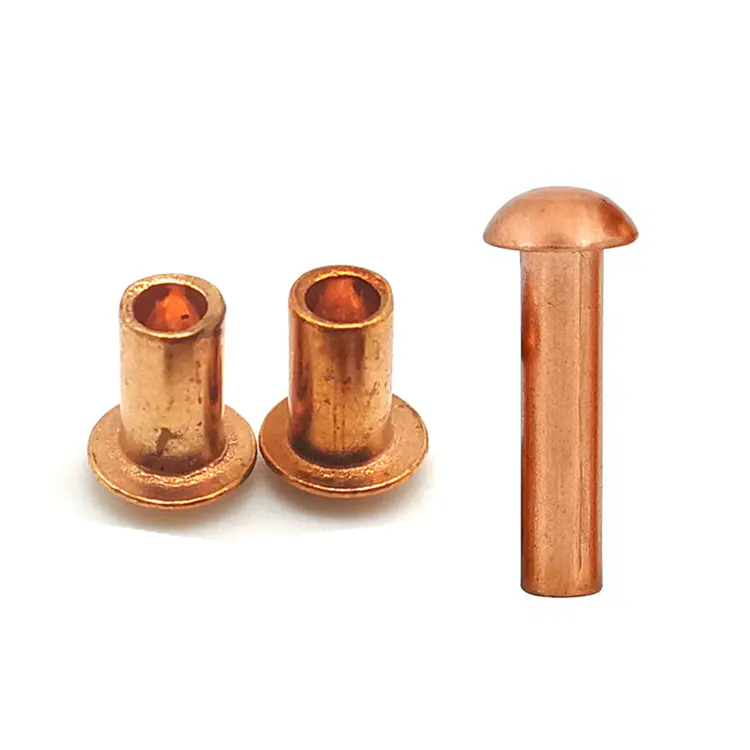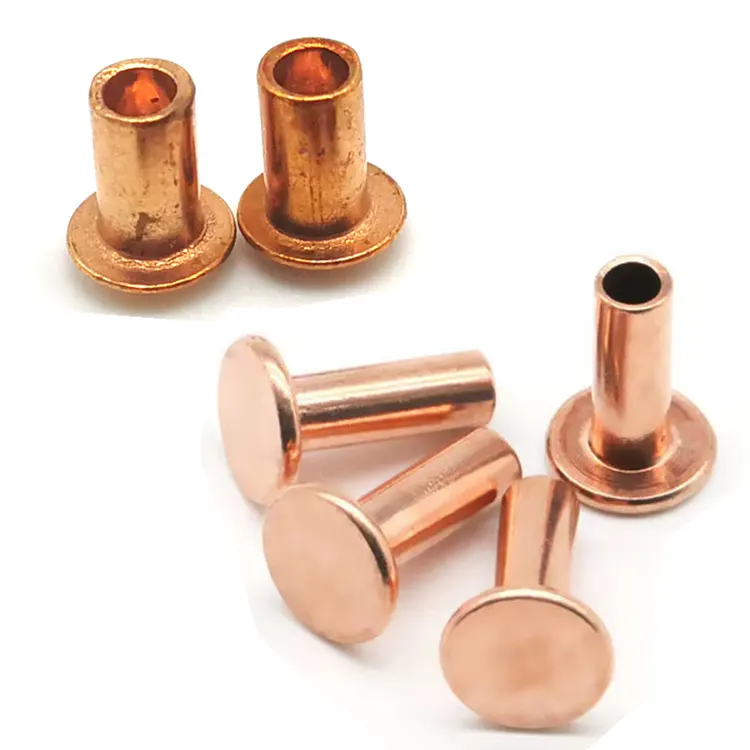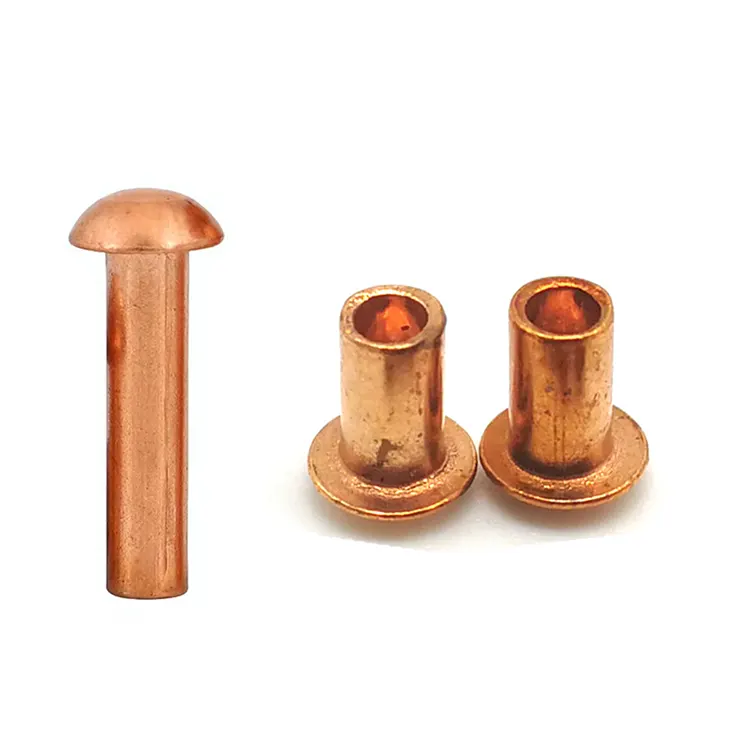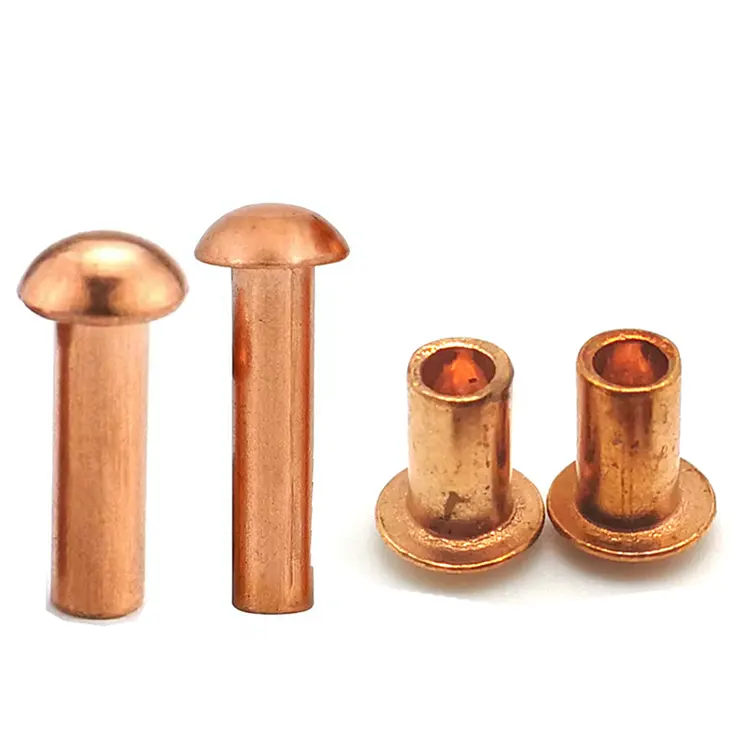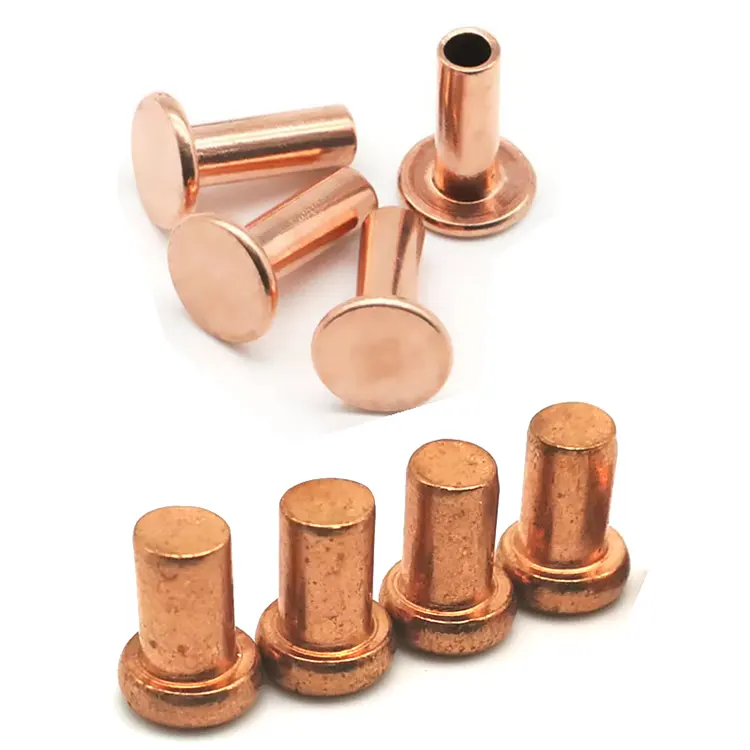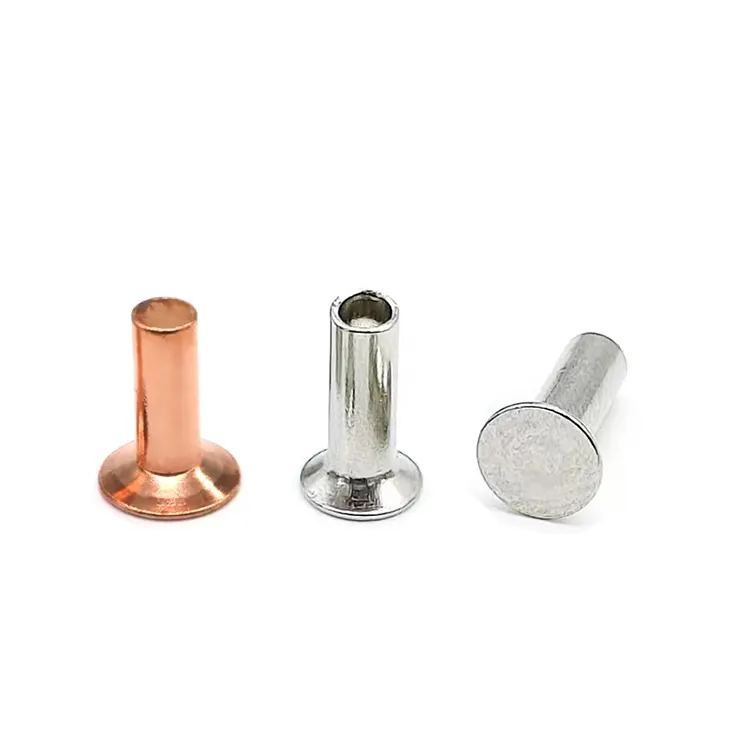Remaches
As one of professional manufacturer in China, Notin would like to provide you Rivets. And we will offer you the best after-sale service and timely delivery.
What is a rivet?
A rivet is a permanent mechanical fastener used to join two or more materials. Rivets work by inserting a metal pin into an aligned hole and deforming the end, creating a strong, secure, and durable connection. Unlike temporary fasteners like screws, rivets do not rely on threads, but instead form a permanent connection, making them ideal for applications requiring high strength, durability, and vibration resistance.
Classification of Rivets
Rivets are typically categorized by head shape, degree of hollowness, or material.
Based on head shape, rivets can be classified as flat head rivets, round head rivets, countersunk head rivets, mushroom head rivets, universal head rivets, truss head rivets, etc.

Based on degree of hollowness, rivets can be classified as solid rivets, semi-tubular rivets, or full tubular rivets.
Based on material, rivets can be classified as brass rivets, stainless steel rivets, steel rivets, aluminum rivets, copper rivets, etc.

What surface finishes are available for rivets?
Rivet surfaces are typically treated with rust-proofing treatments, primarily electroplating, including zinc plating, nickel plating, chrome plating, tin plating, gold plating, and silver plating. Electroplating is a common rust-proofing method for rivets. It applies a layer of plating to the rivet surface through physical or chemical methods. The plating effectively prevents corrosion and rust, while also providing a certain aesthetic effect.
Another special surface treatment method is head coating. Head coating is performed after the rivet is electroplated. This allows for a variety of colors on the rivet head, achieving an aesthetically pleasing finish.
Aluminum rivets cannot be electroplated, but they can be anodized. Anodizing also allows for a variety of color options, but the unit price is higher than electroplating.
Rust-proofing the rivet surface is crucial, effectively extending the rivet's service life and ensuring a secure connection. Different rust-proofing methods are suitable for different environments and applications, so the choice should be tailored to the specific situation.
- View as
Remaches de cabeza redonda de cobre
Los remaches de cabeza redonda de cobre son un tipo de sujetador ampliamente utilizado en la fabricación industrial, la fabricación de muebles y otros campos. El cobre, también conocido como cobre libre de oxígeno, es una aleación de cobre de alta pureza que se caracteriza por una excelente conductividad eléctrica y térmica, así como por una buena resistencia a la corrosión y ductilidad. Estas propiedades garantizan que los remaches de cabeza redonda de cobre mantengan un rendimiento estable en diversos entornos, extendiendo su vida útil. Además, el cobre tiene ciertas propiedades antibacterianas, que pueden reducir el riesgo de crecimiento bacteriano en productos que entran frecuentemente en contacto con el cuerpo humano.
Leer másEnviar ConsultaRemaches de cobre
Nuote Metals es un fabricante profesional de remaches ubicado en Dongguan, China. Los remaches de cobre que fabricamos están hechos de cobre C1100. Los remaches de cobre son un sujetador de uso común. El cobre tiene una excelente conductividad térmica, lo que lo hace ampliamente utilizado en aplicaciones eléctricas y de disipación de calor. Además, los remaches de cobre ofrecen una excelente maquinabilidad y plasticidad, lo que permite producirlos en una variedad de formas y tamaños.
Leer másEnviar ConsultaRemaches de cabeza plana de cobre
Los remaches de cabeza plana de cobre son de alta pureza y ofrecen una excelente conductividad, lo que los hace adecuados para aplicaciones que requieren alta conductividad. Nuote Metals se especializa en la producción de remaches de cabeza plana de cobre. Utilizamos calidades con alto contenido de cobre, como C1100, pero también podemos producir calidades personalizadas. Nuestros remaches de cobre se someten a un tratamiento superficial especial para resistir la oxidación y resistir una prueba de niebla salina de 48 horas.
Leer másEnviar ConsultaRemaches de cabeza de seta de cobre
Los remaches de cabeza de hongo de cobre son componentes mecánicos que se utilizan para sujetar dos o más materiales. Por lo general, tienen una cabeza en forma de hongo y una varilla sólida o semihueca en el otro extremo. Durante la instalación, el otro extremo se martilla o golpea con una remachadora especializada, lo que hace que se expanda y forme la otra cabeza, que luego encaja en su lugar. Nuote Metals es especialista en remaches de cabeza de seta de cobre. Ofrecemos una amplia gama de especificaciones de remaches y utilizamos más de 40 máquinas remachadoras de varios tamaños para satisfacer las necesidades de los clientes.
Leer másEnviar ConsultaRemaches de cabeza plana de cobre
Nuote Metals, ubicada en Dongguan, China, es un fabricante profesional de remaches. Nuestros remaches son de alta calidad y entrega garantizada, lo que les otorga una reputación favorable entre los clientes nacionales e internacionales. Nuestros remaches de cobre de cabeza plana están hechos de cobre de alta calidad y ofrecen una superficie suave y delicada y una sensación estable y firme. Su diseño de cabeza plana no sólo aumenta el área de contacto sino que también dispersa eficazmente la presión, asegurando una conexión más estable.
Leer másEnviar ConsultaRemaches de cabeza avellanada de cobre
Los remaches de cabeza avellanada de cobre producidos por Nuote Metals en China son sujetadores metálicos comunes que se utilizan principalmente en la fabricación de maquinaria, equipos electrónicos, ensamblaje de muebles y otros campos industriales. Como material metálico tradicional, el cobre tiene una excelente conductividad eléctrica y térmica y resistencia a la corrosión, lo que lo hace popular en aplicaciones específicas. Los remaches de cabeza avellanada son sujetadores fabricados mediante procesos de estampado en frío o forjado en caliente. Su estructura simple requiere herramientas de remachado para crear una conexión especializada.
Leer másEnviar ConsultaWhat are the advantages of rivets over other fasteners?
1. Ease of Installation
Rivets are fast to install, and even fully automated for high-volume applications, resulting in a simple and efficient operation process.
2. Connection Reliability
The riveting process is standardized, with strict quality control, resulting in highly stable connections. Visual inspection allows for quick verification of connection quality.
3. Vibration and Impact Resistance
Rivets connect through deformation or interference fit, providing strong clamping force and excellent vibration resistance, capable of withstanding vibration and shock.
4. Low Cost
Rivets are easy to install and can be fully automated, saving significant labor costs.
What are the advantages and disadvantages of rivets made of different materials?
Aluminum Rivets
Advantages: Lightweight, reduces overall product weight, low cost, suitable for general civilian applications.
Disadvantages: Low tensile and shear strength, unsuitable for high-strength workpieces, prone to electrochemical corrosion when in contact with metals such as stainless steel.
Stainless Steel Rivets
Advantages: Strong corrosion resistance, high hardness, suitable for high-strength workpieces (such as marine equipment)
Disadvantages: Higher cost, typically more expensive than aluminum rivets of the same specification.
Brass and Copper Rivets
Advantages: Excellent conductivity (such as connecting electronic components), good corrosion resistance.
Disadvantages: Higher cost, more difficult to process.
Steel Rivets
Advantages: High hardness, high connection reliability, and wide applicability.
Disadvantages: Compared to other materials, iron rivets are more prone to rusting.
What are the main applications of rivets?
Rivets have a wide range of uses, from small items like a pair of scissors to large items like airplanes and ships, as well as in high-precision medical applications.
Industrial Manufacturing
Rivets are used in a wide variety of industrial fields, wherever there is a need to connect two or more materials.
Electronics
Rivets secure heat sinks and chips, providing both vibration damping and noise reduction, and are widely used in the cooling systems of electronic products such as computers and mobile phones.
Automotive
Rivets are widely used to connect components of automobile bodies and chassis, such as doors and hoods. Their lightweight and corrosion-resistant properties make them an indispensable joining method in automotive manufacturing.
Aerospace
In aircraft manufacturing, rivets are used to connect different fuselage components, such as wings and tailplanes. Millions of rivets create high-strength, corrosion-resistant joints. Aluminum and titanium alloy rivets are often used to connect components of corresponding materials, ensuring stability in extreme environments.
Rivets are used everywhere. The above examples only represent a small number of their applications. We see rivets everywhere in our daily lives, such as on scissors, folding beds, and strollers etc. Rivets can be customized to different sizes and materials depending on the application.
Nuote Metals has specialized in the rivet industry for over a decade. Our factory is located in Dongguan, a city known as the "World Factory," a city with a developed industry and convenient transportation. This allows us to respond quickly when acquiring raw materials and supporting surface treatments, meeting our customers' needs for quick access to samples and bulk orders. We produce 10 million rivets daily and have molds of various specifications, allowing us to produce rivets as small as 0.8mm and as large as 10mm. We welcome your inquiries and visits.






